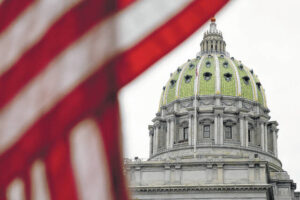WILKES-BARRE — At an event at the Lehigh Valley International Airport this week, Pennsylvania Department of Transportation (PennDOT) Secretary Mike Carroll joined the officials from the airport and the American Automobile Association (AAA), to remind Pennsylvanians of federal REAL ID enforcement starting May 7.
Getting a REAL ID is optional in Pennsylvania, but beginning May 7, travelers will need a REAL ID-compliant driver’s license or ID card, or another form of federally-acceptable identification — such as a valid passport or military ID — to board a domestic commercial flight, and enter a military base or other federal facilities that require ID at the door.
More than 2.6 million Pennsylvanians have gotten a REAL ID driver’s license or ID card since they became available in the state in 2019.
“Pennsylvanians have options available to apply for a REAL ID-compliant product — mailed to you when you apply at a driver license center — or issued over-the-counter at a REAL ID center,” said Secretary Carroll. “With federal REAL ID enforcement beginning on May 7, your travel planning should include making sure you have proper ID to fly, especially if you have flights planned for the summer.”
Rep. Meuser co-sponsors legislation to impose maximum pressure on Iran
U.S. Rep. Dan Meuser, R-Dallas, this week co-sponsored H.R. 2570 — the Maximum Pressure Act — to impose the toughest sanctions yet on Iran and cut off its ability to fund terrorism across the Middle East.
Rep. Meuser said that for years, Iran has fueled instability by financially supporting terrorist groups such as Hezbollah, Hamas, and the Houthis. He said weak enforcement of existing sanctions has encouraged its aggression, leading to deadly events, including the Oct. 7, Hamas attack on Israel, which killed over a thousand victims, including Americans, and triggered further strikes on U.S. forces and commercial vessels.
Rep. Meuser said the Maximum Pressure Act would codify President Trump’s maximum-pressure strategy by strengthening sanctions and blocking Iranian funds used for terrorism. He said it authorizes the U.S. government to seize Iran’s $6 billion ransom payment and redirect it to compensate American victims of terrorism.
Rep. Meuser said the bill also expands rewards for capturing those responsible for the Oct. 7 attack, cracks down on Iran’s missile and drone programs, blacklists all unsanctioned Iranian banks, and mandates a full investigation into Iranian intelligence activity within the United States.
Additionally, Rep. Meuser said it requires a report on how past sanctions relief may have benefited terrorist groups backed by Iran and prevents future administrations from lifting these sanctions without congressional approval.
Rep. Meuser said sanctions on Iranian oil have historically been a highly effective tool in limiting the regime’s financial power. Rep. Meuser said strict sanctions reduced Iran’s foreign reserves to just $4 billion.
“The Maximum Pressure Act is a critical step in cutting off the Iranian regime’s ability to bankroll its proxy terror networks, including Hamas and Hezbollah,” Rep. Meuser said. “By codifying strong, enforceable sanctions, we’re sending a clear message — the United States will not tolerate attacks on our allies, our service-members, or our interests. I urge my colleagues to support H.R. 2570 — to protect U.S. national security, support our allies in the Middle East, and prevent further Iranian aggression.”
H.R.2570 has been referred to several committees for further consideration.
Saving Penn State Schuylkill: Roundtable presents data against potential closure
Students, educators, employers and concerned citizens filled the John E. Morgan Auditorium at Penn State Schuylkill this week to share their strong opposition to Penn State’s plan to potentially close the campus.
Hosted by Sen. Dave Argall (R-Pottsville) and Reps. Tim Twardzik (R-123), Jamie Barton (R-124), JoAnne Stehr (R-107) and Dane Watro (R-Hazleton), the event described how Penn State Schuylkill has changed lives throughout Schuylkill County and beyond.
Argall opened the hearing by noting that the goal was to provide Penn State with as much information as possible about Penn State Schuylkill’s impact on the community to guide their final decision.
During the first panel, Dr. Cory Scherer, the interim chancellor of Penn State Schuylkill, shared that despite the news of the potential closure, applications and acceptances have increased compared to last year. He also discussed how the significant wait to hear Penn State leadership’s final decision has taken a serious toll on students, educators and administrators.
The second panel featured elected officials and employers from Schuylkill County, who discussed how the campus has positively impacted local communities and the regional economy.
Robert Carl, the president of the Schuylkill Chamber of Commerce, discussed the success of Penn State Schuylkill’s recently created nursing program, which serves as a direct workforce pipeline to local healthcare systems. He also referenced a report indicating that Penn State Schuylkill was a local anchor institution that contributed $33.9 million to Pennsylvania’s economy.
The final panel featured students, who shared their perspectives on how Penn State Schuylkill has changed their lives.
Seth Hubler, a Penn State Schuylkill alumnus, discussed his Penn State Schuylkill experience, including traveling internationally, serving as the Student Body President, and participating in the co-op program.
At the conclusion of the event, members of the public shared their stories about the value of the campus to Schuylkill County.
Barton said, “If Penn State needed any evidence as to why this campus cannot close, this roundtable is all the proof needed. So many people are fighting to keep this campus open.”
Argall closed the hearing with a warning, saying, “I have supported Penn State’s appropriation each and every year in my time in the House and the Senate. If they close this campus down, I will never support this funding again.”

